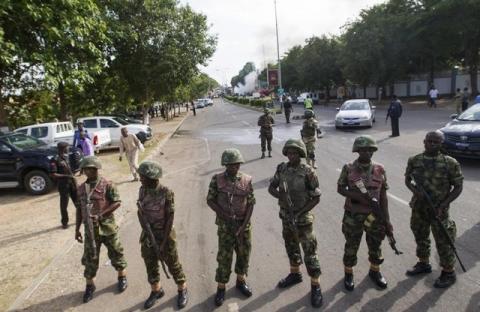Advertisement
Nigerian inquiry says army killed 348 Shi'ites in northern city
LAGOS (Reuters) - Nigeria's army killed 349 people from the minority Shi'ite Muslim sect last December in a series of clashes for which troops involved should be prosecuted, a judicial inquiry has concluded in a report.
How the authorities respond to the inquiry's findings may indicate the extent to which reform is being implemented under a drive by President Muhammadu Buhari, a former military ruler, to root out human rights violations by soldiers.
The United States blocked arms sales to Nigeria and ended training of troops there under Buhari's predecessor Goodluck Jonathan, partly on concerns over human rights such as the treatment of captured suspected insurgents.
The report published on Sunday confirms claims by human rights groups such as Amnesty International that the army killed hundreds of Shi'ite Muslims during three days of clashes in the northern city of Zaria. The army has repeatedly denied this.
"The Nigerian Army used excessive force," said the report by a commission appointed by Kaduna state, where Zaria is located.
"The Commission therefore recommends that steps should immediately be taken to identify the members of the NA (Nigerian Army) who participated in the killings of 12th — 14th December 2015 incident with a view to prosecuting them," it said.
The army has said Shi'ites had blocked its chief of staff, Lieutenant General Tukur Buratai, and assassinate him.
"We are aware that the report has been made public and we are studying it," Nigerian army spokesman Sani Usman said on Monday.
The commission's findings contained in the report said 349 people - including one soldier - were killed.
"Out of the said 349 dead persons, 347 (excluding the soldier) were buried in a mass grave," said the report.
The commission said it had received 3,578 memoranda - 132 letters and 3,446 emails - along with 39 exhibits and 87 witnesses testimonies in the course of the inquiry and the writing of the 193-page report
Africa's most populous nation has around 180 million people, including several thousand Shi'ite Muslims whose movement was inspired by the 1979 Islamic Revolution in Shi'ite Iran.
The majority of the country's tens of millions of Muslims are Sunni - including the Boko Haram jihadist militants who have killed thousands in bombings and shootings mainly in the northeast since 2009.
(Editing by Ulf Laessing and Tom Heneghan)



















Add new comment